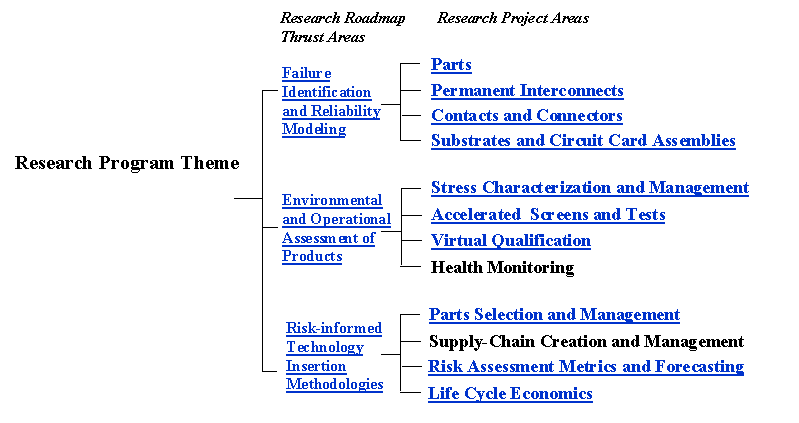CALCE EPS Consortium
"Excellence in Electronic Products and Systems
for over 20 Years"
The Center for Advanced Life Cycle Engineering (CALCE) Electronic Products and Systems Consortium brings together the
world's leading avionics, automotive, computer, semiconductor, and
electronics manufacturers in a successful international
industry-government-academic partnership. The Consortium provides
information and services that match industry needs and provides an
organizational structure by which different sectors of the electronics
industry supply chain can share information and influence practices and
policies.
CALCE EPS Consortium Mission
CALCE EPS Consortium mission is to provide a knowledge and resource base
to support the development of competitive electronic products and systems
in a timely manner. The knowledge and resource base includes:
- design and manufacturing methods,
- simulation techniques,
- models,
- experimental methods,
- guidelines,
- instructional information, and
- future engineers and technical leaders.
CALCE EPS Consortium Projects
CALCE performs core research projects on an annual basis. These research
projects are developed in collaboration with Consortium members. Core Projects
are designed to be consistent with the Thrust Areas listed below which
is developed by the Center to address the needs of the Consortium members
and the Consortium as a whole. Core research proposals are presented
at the Planning Meeting and become part of the next year's research agenda
at the Fall Reviews Meeting. (For more information about the Consortium
Thrust Areas, see
Membership in the Consortium carries the right to direct a Consortium
core research project at an effort level of $65,000 (1 unit). The results
of core projects are shared with all the members (including additional
sites and associate members) of the Consortium.
Any organization can initiate a non-core research project with the CALCE
EPSC. Separately funded, these projects are usually more specific to the
company's immediate interests, and may involve proprietary information
which is not shared with the other members of the consortium.
CALCE members have access to all software, web-based resources, final
reports and experimental data which result from the core projects. All
information is available through the Consortium Roadmaps and is located
under the Members Only Area of the CALCE website.
CALCE current year projects
How CALCE EPS Consortium Operates?
The CALCE EPS Consortium pursues its mission by:
-
Conducting cross disciplinary research to enable efficient and cost effective
development of competitive products and systems.
-
Developing infrastructure to support industry
- Guidelines
- Software
- Tutorials and case studies
-
Meeting with "leaders" to identify key bottlenecks, challenges and roadmaps
needed to gain and sustain a competitive edge in the development of electronic
products and systems.
- Forming "special interest groups" to layout required R & D.
-
Training next generation of professionals in analysis, synthesis and leadership
skills.
-
Short courses and workshops
-
Undergraduate and graduate courses
-
Obtaining feedback for continuous improvement.
CALCE Organization
The CALCE Center is an entity in the University of Maryland, which
includes various sponsored programs, groups and alliances. The Center is
comprised of renowned research and teaching faculty, research scientists
and research engineers with the inter-disciplinary backgrounds. These are
in turn supported by a team of technical staff, and Ph.D. and M.S. candidates.
An industry-university liaison and an administrative staff help assist
in daily operations, public relations, communications, contractual issues,
Industrial Advisory Board (IAB) meetings, workshops, conferences and publications.
An organization chart can be found at http://www.calce.umd.edu/general/faculty.
The Center operates within the administrative structure of the
Clark School of Engineering, where it enjoys the full support of the Dean
of Engineering, who serves as the Clark School of Engineering representative
to the Consortium. The director, Professor Michael Pecht has a BS in
Acoustics, a MS in Electrical Engineering and a MS and PhD in Engineering
Mechanics from the University of Wisconsin. He is a Professional Engineer,
an IEEE Fellow, an ASME Fellow and a Westinghouse Fellow, and has written
sixteen books on electronics technologies and electronics products
development. He served as chief editor of the IEEE Transactions on
Reliability for eight years, on the advisory board of IEEE Spectrum and
as the chief editor for Microelectronics Reliability International. He
serves on the board of advisors for various companies and consults,
providing expertise in strategic planning and reliability assessment of
electronics products and systems.
Profiles Of Principal Investigators.
How to become a CALCE
EPS Consortium member
Contacts:
|


